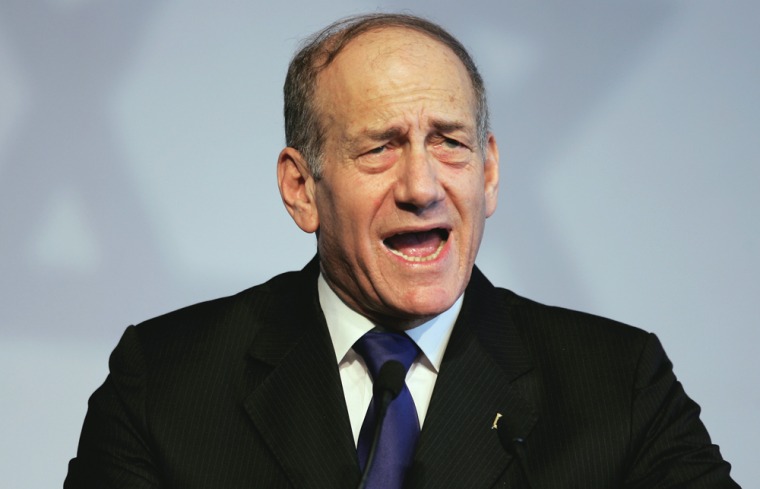The Lebanon war has cost Ehud Olmert much of his political capital: With approval ratings plummeting, the prime minister has been forced to shelve his West Bank pullout plan and is struggling to ride out a growing public storm over the government’s wartime bungles.
At the start of his term three months ago, Olmert had been confident he could draw Israel’s final borders by 2010 by pulling out of much of the West Bank unilaterally. He’d turn Israel into a “fun place to live,” he promised.
After 34 days of fighting Hezbollah guerrillas, Olmert is more subdued and is increasingly turning to others for advice, members of his inner circle say.
The war ended with considerable losses for Israel — more than 100 killed, hundreds wounded, hundreds of thousands displaced — but no clear gains. Critics caution the U.N.-brokered cease-fire is unlikely to push Hezbollah away from the Israeli border, let alone prevent it from being rearmed by Syria and Iran.
‘Deal with other issues’
On the domestic front, the Lebanon fighting, along with Israel’s offensive against Islamic militants in Gaza, appears to have discredited the idea of unilateralism. Israeli troops left Lebanon in 2000 and Gaza in 2005, in both cases without a peace deal.
The renewed fighting in both areas drove home the message that a unilateral pullout does not offer protection against militant attacks. Hezbollah fired nearly 4,000 rockets from Lebanon at northern Israel during the war. Palestinian militants have also rocketed Israeli border towns, on a much smaller scale, since Israel’s pullout from Gaza.
At the height of the war in Lebanon, Olmert asserted that the fighting could create momentum for a West Bank pullout, prompting angry accusations that he was trying to hijack the war for a divisive political agenda. However, in meetings this week, the prime minister told Cabinet ministers and key legislators that the West Bank plan was being shelved.
A top Olmert aide, Asaf Shariv, confirmed the policy shift. “Right now, we will deal with other issues,” Shariv said Friday. “It’s not that it (the pullout) was canceled, but it is not on the agenda.”
But that strips Olmert’s coalition of its main reason for being — making another attempt to resolve the conflict with the Palestinians. Olmert would be hard-pressed to find an alternative to the West Bank plan, since peace talks are expected to remain frozen as long as the Islamic militant Hamas is in charge in the West Bank and Gaza.
Questions mount
Bereft of a program, Olmert’s government — an uneasy alliance of his centrist Kadima and the center-left Labor — is increasingly vulnerable to political attack, especially as complaints mount about the war.
The list of tough questions is growing by the day.
Why did Olmert appoint Labor Party leader Amir Peretz, untested in military matters, as defense minister? Why did he decide to go to war hours after Hezbollah carried out a deadly cross-border raid July 12? Why did he agree to a cease-fire that doesn’t meet the most basic of Israel’s demands, that Hezbollah fighters be forced back from the border?
Critics are demanding an official commission of inquiry, with the power to dismiss top government officials. Such a commission forced Ariel Sharon to resign from the defense minister’s job after Israel’s 1982 war in Lebanon.
“With so many questions in the air, with a commission of inquiry, defiant citizens and a political tsunami on the way, it’s time to get set for early elections,” political commentator Yoel Marcus wrote in Friday’s Haaretz daily.
Weathering the storm
Olmert’s political survival will depend, to a large degree, on how long the storm lasts.
Parliament could order its own inquiry when it reconvenes in October, said Hanan Krystal, political commentator for Israel Radio. Olmert remains unchallenged in the Kadima Party for now, since no strong rival as emerged. But his old nemesis, right-wing opposition leader Benjamin Netanyahu — sidelined in the past year for opposing the popular Gaza withdrawal — appears to be making a comeback.
Olmert’s troubles could be compounded by legal entanglements. Haim Ramon, his close ally and chief ideologue of the West Bank pullout, said Friday he would resign as justice minister next week because of a pending indictment on a charge of “indecent assault” of an 18-year-old female soldier at a government office. Ramon’s departure would further weaken the Olmert camp in Kadima.
The next election is not scheduled until 2010, but in the past decade, no Israeli government has survived a full four-year term. Polls suggest a majority of Israelis are not demanding Olmert’s resignation, for now.
“But he is definitely in trouble,” said analyst Yosef Alpher. “His situation does not look good.”
